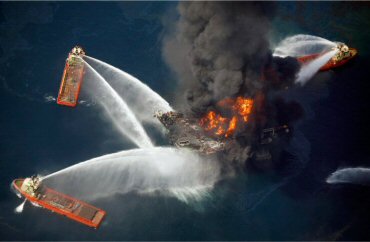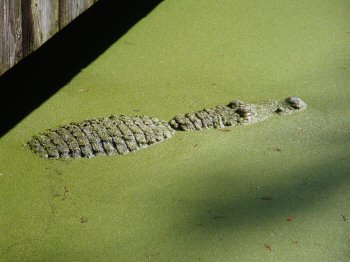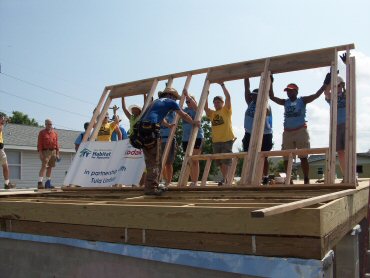Journalists are eligible for free email subscriptions to SEJournal, including TipSheet, WatchDog (on access issues) and more.
Day Tours
Independent Hospitality Receptions
| Agenda | Coverage | Lodging/ Travel | Advertise/ Exhibit | Environmental News | About New Orleans |
Tour bus staging, registration and SEJ table for sign-ups, as well as evening receptions, will be held at the Hilton New Orleans Riverside, Two Poydras Street, New Orleans.
Registration
6:00 - 10:00 a.m. and Noon - 5:00 p.m.
If you didn't sign up ahead of time for the Saturday night party or Sunday breakfast at the Audubon Zoo, there may still be room — please check with registration.
Location: 1st Floor Registration Counters (across from escalators in the conference area)
SEJ Information Table
8:00 a.m. - 5:00 p.m.
Sign up here for Mini-tours and Beat Dinners. Read up on SEJ Board candidates, and find information about SEJ Award winners, membership and services. Pick up copies of SEJournal and other SEJ information.
Location: Next to registration
Tours in the Field
Advance registration and a fee are required for all Thursday tours. Registered tour attendees should report to the staging area no later than 15 minutes before their scheduled departure time. All tours depart promptly at times listed below and return to the Hilton New Orleans Riverside about 5:00 p.m.
Buses will stage and depart from the Hilton New Orleans Riverside just across from SEJ Registration on Side Drive. If you've not registered yet, stop by registration near the ballroom to pick up your conference materials, then exit through the doors between the Gift Shop and escalators.
Due to morning-of cancellations or available space, some tours may be able to take standby passengers. Standby passengers should report 15 minutes prior to departure and have the tour fee available. Standby passengers will be admitted on a first-come/first-served basis, after those already on a waiting list.
For breakfast options, the River Blends Café, located in the Hilton, opens at 6:00 a.m. If you're on the first tour, that probably only gives you enough time to grab a coffee and a roll, but the rest of you would have time to sit and eat. Le Croissant, also in the Hilton, opens at 6:30 a.m. Numerous other options are within walking distance of the Hilton. Check your registration packet for a list of restaurants and breakfast suggestions.
1. After BP: Are We Really Prepared Offshore?
(6:30 a.m. departure, $40 fee, lunch included)
 |
| The BP Deepwater Horizon blowout and oil spill in 2010. © Photo courtesy NOLA.com | The Times-Picayune. |
The four years since Deepwater Horizon have been about improving our readiness for spills and raising offshore drilling safety standards, but as Gulf drilling keeps expanding and pushing limits, U.S. regulators remain reactive rather than proactive, contractors still escape scrutiny and violations still get covered up. With that in mind, we will go behind the scenes at a leading spill response outfit, hear directly from offshore regulators, visit with a whistleblower who sacrificed his livelihood to expose offshore criminal activity and, finally, jump on a boat to witness a rig in action and see for ourselves the safety challenges and unpredictability of working on an oil rig. Total drive time – 5 hours. Coverage.
Tour Leaders:
David Hammer, Investigative Reporter, WWL-TV Channel 4 (CBS), New Orleans
Jennifer Larino, Business Reporter, NOLA.com | The Times-Picayune
Speakers:
Donald Boesch, Professor, Marine Science and President, Center for Environmental Science, University of Maryland
Michael Bromwich, Managing Principal, The Bromwich Group
Randy Comeaux, Terminated Whistleblower, ATP Titan, Mississippi Canyon 941; Terminated Whistleblower, W&T Offshore, Ewing Banks 910
Charlie Williams, Executive Director, Center for Offshore Safety; Chief Scientist, Well Engineering and Production Technology, Shell
2. Rebuilding Barrier Islands and Restoring Marshes
(7:00 a.m. departure, $40 fee, lunch included)
Studies show that most of southeast Louisiana will be drowned by the Gulf of Mexico before 2100 because it is sinking at one of the world’s fastest rates, while at the same time, seas are rising. The state and federal wetlands restoration community is fighting that fate by using Mississippi River and offshore sediment deposits to rebuild vanishing marshes and barrier islands. Attendees will visit two restoration sites, including a barrier island rebuilding project and a marsh restoration project south of New Orleans in Plaquemines Parish. The trip includes two boat rides, a seafood lunch at Woodland Plantation, and opportunities to see coastal restoration, both in progress and complete. Over 10 wetland experts will be on hand for the tour and during the winding two-hour bus ride across some of the most vulnerable coastal wetlands on the planet. Total drive time – 4 hours. Coverage.
- Resource: "Losing Ground," August 28, 2014, by Bob Marshall, The Lens and Brian Jacobs and Al Shaw, ProPublica.
Tour Leaders:
Gloria Gonzalez, Senior Associate, Carbon Program, Ecosystem Marketplace
Bob Marshall, Staff Writer, The Lens
Speakers:
Kenneth Bahlinger, Coastal Restoration Project Manager, Louisiana Coastal Protection and Restoration Authority
Virginia Burkett, Chief Scientist for Climate and Land Use Change, U.S. Geological Survey
Darryl Clark, CWPPRA Coordinator and Project Manager, and Senior Fish and Wildlife Biologist, Louisiana Ecological Services Office, U. S. Fish and Wildlife Service
Brad Inman, CWPPRA Chairman, Planning and Evaluation Committee and Senior Project Manager, Restoration Branch, Protection and Restoration Office, New Orleans District, U.S. Army Corps of Engineers
Paul Kaspar, Project Manager for the "Mississippi River Sediment Delivery System – Bayou Dupont" Project, Environmental Engineer and Chief, Permits Oversight Section, Region 6, U.S. Environmental Protection Agency
Quin Kinler, Resource Conservationist, Water Resources Planning, Natural Resources Conservation Service, U.S. Department of Agriculture
Mel Landry, Marine Fisheries Habitat Specialist, Fisheries Service, National Oceanic and Atmospheric Administration
Sarah Mack, President and Chief Executive Officer, Tierra Resources LLC
Cherie Price, Planner for LCA Mississippi River Hydrodynamics and Delta Management Study, Restoration Branch, Protection and Restoration Office, New Orleans District, U.S. Army Corps of Engineers
George Ricks, Charter Captain and President, Save Louisiana Coalition
Kevin Roy, Project Manager for the "Lake Hermitage Marsh Creation Project" and Senior Fish and Wildlife Biologist, Louisiana Ecological Services Office, U. S. Fish and Wildlife Service
Susan Testroet-Bergeron, CWPPRA Public Outreach Coordinator, National Wetlands Research Center, U.S. Geological Survey
Eugene Turner, Boyd Professor, Department of Oceanography and Coastal Sciences, School of the Coast and Environment, Louisiana State University
3. If the Gators Don’t Get You... the Sinkhole Will
(7:15 a.m. departure, $40 fee, lunch included)
 |
| © Alligator photo courtesy Ly Cao. |
What are ya, wimps? We’ll take you to the heart of Louisiana’s swampland to visit the Atchafalaya Basin and the Bayou Corne-area sinkhole. U.S. Geological Survey scientists will lead a morning boat trip into the million-acre basin, the largest river swamp in the United States. Here we’ll see alligators, wintering waterfowl, invasive nutria and huge cypress trees. Then, in the afternoon, you’ll see the sinkhole for yourself. The 26-acre hole emerged from cypress forest in August 2012 because a salt dome cavern failed deep underground. Hear from parish and Texas Brine Co. officials and residents about the environmental disaster. Total drive time – 4 hours. Coverage.
Tour Leaders:
Randy Lee Loftis, Environmental Writer, The Dallas Morning News
David Mitchell, Reporter, The (Baton Rouge) Advocate
Speakers:
John Boudreaux, Director, Assumption Parish Office, Homeland Security and Emergency Preparedness
Jacoby Carter, Research Ecologist, National Wetlands Research Center, U.S. Geological Survey
Patrick Courreges, Communications Director, Louisiana Department of Natural Resources
Sonny Cranch, Spokesman, Texas Brine Company
Dan Kroes, Floodplain Ecologist, Louisiana Water Science Center, U.S. Geological Survey
Dennis Landry, Resident and Local Business Owner, Bayou Corne
Mike Schaff, Departing Resident of Bayou Corne
Wilma Subra, Environmental Scientist; President, Subra Company (New Iberia, LA); Vice-Chair, National Advisory Council for Environmental Policy and Technology, U.S. Environmental Protection Agency; Member, U.S. EPA National Environmental Justice Advisory Council; and Recipient, MacArthur Fellowship Genius Award
Christopher Swarzenski, Wetlands Hydrologist and Ecologist, U.S. Geological Survey
4. Chemical Corridor: Industry, Community and Environmental Health Impacts
(7:30 a.m. departure, $40 fee, lunch included)
The boom in North American oil and gas extraction is fueling expansion in Louisiana’s petrochemical industry, with nearly $84 billion in new plant construction planned. We will visit petrochemical and refining facilities and their surrounding communities to learn how the plants operate and what the expected expansion will mean for the surrounding environment and neighboring communities’ health. We will hear from industry experts, environmental health and justice advocates, occupational health and safety experts to learn how environmental safety and health are addressed and how adjacent communities have been grappling with these issues. Total drive time – 3 hours.
Tour Leaders:
Elizabeth Grossman, Freelance Journalist
Amy Wold, Reporter, The (Baton Rouge) Advocate
Speakers:
Dan Borne, President, Louisiana Chemical Association
Celena Cage, Enforcement Administrator, Louisiana State Department of Environmental Quality
Chris John, President, Louisiana Mid-Continent Oil and Gas Association (invited)
Kim Nibarger, Health and Safety Specialist, United Steelworkers
Marylee Orr, Executive Director, Louisiana Environmental Action Network
Anne Rolfes, Founding Director, Louisiana Bucket Brigade
Daniel Roczniak, Senior Director, Responsible Care ® & Value Chain Outreach, American Chemistry Council
Wilma Subra, Environmental Scientist; President, Subra Company (New Iberia, LA); Vice-Chair, National Advisory Council for Environmental Policy and Technology, U.S. Environmental Protection Agency; Member, U.S. EPA National Environmental Justice Advisory Council; and Recipient, MacArthur Fellowship Genius Award
Tegan Treadaway, Air Permits Administrator, Louisiana State Department of Environmental Quality
Louisiana Economic Development representative TBA
5. Oyster Reefs and Fisheries in the Aftermath of BP and Katrina
(8:00 a.m. departure, $40 fee, lunch included)
We’ll head to Empire, near the Mississippi River’s mouth, and hop on boats to examine oyster reefs. Oysterers and scientists will discuss how oyster beds are seeded and harvested, and why the brackish mix of salt and fresh water is needed to grow the Gulf of Mexico’s large mollusks. We’ll also hear about impending new freshwater diversions that are expected to build wetlands, but also could doom existing oyster reefs. We’ll also discuss the effects of Katrina, the BP oil spill, changes in the oyster industry, and the low-oxygen “dead zone” along Louisiana’s coast on local oyster harvesting. We might even taste some oysters from the boat. Total drive time – 3 hours. Coverage.
Tour Leaders:
Benjamin Alexander-Bloch, Staff Writer, NOLA.com | The Times-Picayune
Robert Thomas, Professor and Director, Center for Environmental Communication, School of Mass Communication, Loyola University New Orleans
Speakers:
David Muth, Director, Mississippi River Delta Restoration Program, National Wildlife Federation
John Tesvich, Chair, Louisiana Oyster Task Force
3rd speaker TBA
6. Fracking, and All That Oil and Gas
(8:30 a.m. departure, $40 fee, lunch included)
Louisiana is enjoying its biggest industrial boom since the oil bust in the 1980s, and decisions on new plants and expansions of existing ones are being driven by ample supplies of cheap natural gas, thanks to advancements in horizontal drilling and hydraulic fracturing technology. Manufacturers who use the clean-burning fuel to power their facilities are reaping the benefits, particularly along the 70-mile corridor between New Orleans and Baton Rouge. Hear what experts on all sides of this issue have to say during a visit to a drilling site in Amite County, Miss., in the Tuscaloosa Marine Shale formation, an emerging oil and gas play. Total drive time – 4 hours. Coverage.
Tour Leaders:
Bobby Magill, Senior Science Writer, Climate Central
Richard Thompson, Reporter, The New Orleans Advocate
Speakers:
David Allen, Melvin H. Gertz Regents Chair in Chemical Engineering, McKetta Department of Chemical Engineering and Director, Center for Energy and Environmental Resources, Cockrell School of Engineering, University of Texas-Austin
Don Briggs, President, Louisiana Oil and Gas Association
Kevin Bruce, Regional Director, State Affairs, America's Natural Gas Alliance
David Dismukes, Professor and Executive Director, Center for Energy Studies, Louisiana State University
Scott Eustis, Coastal Wetlands Specialist, Gulf Restoration Network
Stephanie Houston Grey, Anti-Fracking Activist and Associate Professor of Rhetoric and Culture, Department of Communication Studies, College of Humanities & Social Sciences, Louisiana State University
Encana representative TBA
Environmental Defense Fund representative TBA
7. Louisiana’s Great Lakes, Cypress Swamps and Woodpeckers
(9:00 a.m. departure, $40 fee, lunch included)
We'll visit the Turtle Cove Environmental Research Station on Lake Maurepas for a pontoon boat ride through cypress swamps, followed by a dip-netting exercise and a delicious lunch of local seafood. Then we'll visit the Big Branch National Wildlife Refuge, a gem on the north shore of Lake Pontchartrain, where we may catch a glimpse of the endangered red-cockaded woodpecker. All along the way, we'll hear from experts about the natural and unnatural history of the Pontchartrain Basin and learn about efforts to restore this important ecosystem. Total drive time – 2.5 hours. Tour limited to 45 people. Dress for the outdoors; bring water, sunscreen, mosquito repellent and binoculars (optional). Coverage.
Tour Leaders:
Christopher Johnston, Freelance Videographer
Sara Shipley Hiles, Freelance Journalist and Assistant Professor, School of Journalism, University of Missouri
Speakers:
Pon Dixson, Refuge Manager, Big Branch National Wildlife Refuge
Thomas Doyle, Deputy Director, National Wetlands Research Center, U.S. Geological Survey
Melanie Driscoll, Director of Bird Conservation, Gulf Coast/Mississippi Flyway, National Audubon Society
Ioannis Georgiou, Associate Professor of Coastal Processes, Department of Earth and Environmental Sciences and Director, Pontchartrain Institute for Environmental Sciences, University of New Orleans
John Lopez, Executive Director, Lake Pontchartrain Basin Foundation
Robert Moreau, Manager, Turtle Cove Environmental Research Center
Alisha Renfro, Staff Scientist, Mississippi River Delta Restoration Campaign, National Wildlife Federation
8. Risky Business: How New Orleans’ Rebuilt Levee System Is So Much Better, But Not Good Enough
(9:30 a.m. departure, $40 fee, lunch included)
We tour the post-Katrina hurricane storm surge risk reduction system — the Army Corps of Engineers’ new name for the flood protection system — and learn how dramatic improvements in design requirements and new technology make New Orleans the best-protected city in the nation. But, we’ll also learn how that protection still won’t save the city from being flooded by the Big One. The tour will view new earthen levees, a 2-mile-long, 26-foot-high storm surge barrier, and a new pump station that could drain all the water out of an Olympic-sized swimming pool in five seconds. Total drive time – 2 hours.
Tour Leaders:
Jeff Adelson, Reporter, The New Orleans Advocate
Juliet Pinto, Associate Professor, School of Journalism & Mass Communication, Florida International University
Speakers:
Ezra Boyd, Hazard Geographer and Disaster Scientist, and Co-Founder, Disastermap.net
Susan Maclay, President, Southeast Louisiana Flood Protection Authority - West
Sandy Rosenthal, Founder and Executive Director, Levees.org
Stevan Spencer, Chief Engineer, Southeast Louisiana Flood Protection Authority - East
U.S. Army Corps of Engineers representative TBA
9. The Long Road Home: Community Resilience, Adaptations, and Legacies From America’s Biggest Rebuild
(10:00 a.m. departure, $40 fee, lunch included)
 |
| Collaborative rebuilding after Hurricane Katrina. |
Each New Orleans community took its own road home. We'll look at what determines who comes back, efforts to rebuild better, and what others can learn from our disaster experiences. We'll tour the Lower 9th Ward to check in on Brad Pitt's Make It Right houses and more traditional church-run renovation projects. We'll look into the replanting going on at Bayou Bienvenue, and have lunch with the Vietnamese fishing and farming communities. We'll return via the Lakefront and discuss efforts to re-connect residents with water. We'll end in Broadmoor — the geographical heart of the city and its latest rebuild efforts — and send you home singing New Orleans style. Total drive time – 3 hours. Coverage.
Tour Leaders:
Adam Glenn, Educator, Graduate School of Journalism, City University of New York; Digital Media Consultant, a2g Media; Editor, SEJournal, Society of Environmental Journalists; Editor, AdaptNY
Julia Kumari Drapkin, Founder and Executive Producer, iSeeChange and Multimedia Reporter/Producer, NOLA.com | The Times-Picayune
Tom Thoren, Freelance Journalist and Open Data Reporter, The Lens
Loretta Williams, Freelance Producer/Editor
Speakers:
Karen Gadbois, Co-Founder and Staff Writer, The Lens
Michael Hecht, President and Chief Executive Officer, Greater New Orleans, Inc.
Arthur Johnson, Executive Director, Lower 9th Ward Center for Sustainable Engagement & Development
Darryl Malek-Wiley, Senior Organizing Representative, Environmental Justice and Community Partnership Program, Sierra Club
Frank Newell, Founder and President, Newell Engineering,LLC
Daniel Nguyen, Environmental Justice Coordinator and Viet Village Urban Farm Sustainable Aquaculture Park Project Manager, MQVN Community Development Corporation
Allison Plyer, Executive Director, The Data Center and Author, "The New Orleans Index"
Michelle Pyne, Green Building Program Associate, Global Green USA
Taylor Royle, Director of Communications, Make it Right Foundation
Jason Stopa, Recovery Planner, Department of Community Development, St. Bernard Parish Government, and former Neighborhood Development Manager, Beacon of Hope Resource Center
David Waggonner, Principal, Waggonner & Ball Architects
Emily Wolff, Director of Community Programming, Wilson Charter School and Broadmoor Improvement Association
Beverly Wright, Professor of Sociology and Director, Deep South Center for Environmental Justice, Dillard University
Peter Yaukey, Professor of Geography, College of Liberal Arts, University of New Orleans
New Orleans Redevelopment Authority representative TBA
Independent Hospitality Receptions
5:00 - 9:00 p.m.
Looking for networking opportunities? After spending all day out on tours, meet with hosts of independent receptions. Reception hosts will have experts, displays, information, and, of course, great food and drink. Check the Independent Receptions Flyer in your conference bag.
Stop by the Octavia Bookstore while you're enjoying the receptions, and don't miss the book-signing event there at 8:00 p.m.
Location: Napoleon Ballroom, 3rd Floor
Wednesday, September 3
Friday, September 5
Saturday, September 6
Sunday, September 7














 Advertisement
Advertisement 



